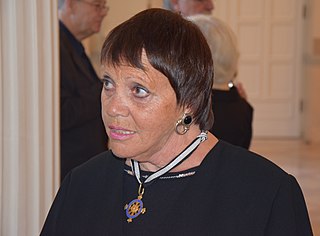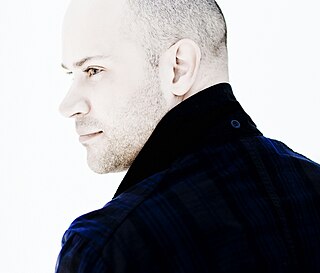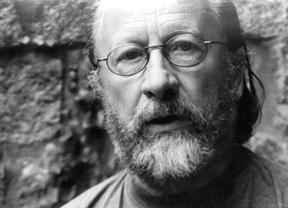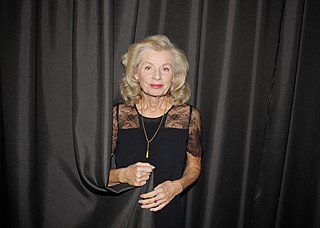
Orfeo ed Euridice is an opera composed by Christoph Willibald Gluck, based on the myth of Orpheus and set to a libretto by Ranieri de' Calzabigi. It belongs to the genre of the azione teatrale, meaning an opera on a mythological subject with choruses and dancing. The piece was first performed at the Burgtheater in Vienna on 5 October 1762, in the presence of Empress Maria Theresa. Orfeo ed Euridice is the first of Gluck's "reform" operas, in which he attempted to replace the abstruse plots and overly complex music of opera seria with a "noble simplicity" in both the music and the drama.

The Komische Oper Berlin is a German opera company based in Berlin. The company produces opera, operetta and musicals.
Brian Asawa was a Japanese American opera singer who sang as a countertenor. About Asawa, Opera News stated: "In his prime, Asawa was an electric performer, his fearless performing style supported by a voice of arresting beauty and expressivity."

Brigitte Fassbaender, is a German mezzo-soprano opera singer and a stage director. From 1999 to 2012 she was intendant of the Tyrolean State Theatre in Innsbruck, Austria. She holds the title Kammersängerin from the Bavarian State Opera in Munich and the Vienna Staatsoper.
Harry Alfred Robert Kupfer was a German opera director and academic. A long-time director at the Komische Oper Berlin, he worked at major opera houses and at festivals internationally. Trained by Walter Felsenstein, he worked in the tradition of realistic directing. At the Bayreuth Festival, he staged Wagner's Der fliegende Holländer in 1978 and Der Ring des Nibelungen in 1988. At the Salzburg Festival, he directed the premiere of Penderecki's Die schwarze Maske in 1986 and Der Rosenkavalier by Richard Strauss in 2014.
Michael Chance CBE is an English countertenor and the founder and Artistic Director of The Grange Festival.
Gaetano Guadagni was an Italian mezzo-soprano castrato singer, most famous for singing the role of Orpheus at the premiere of Gluck's opera Orfeo ed Euridice in 1762.

Bejun Mehta is an American countertenor. He has been awarded the Echo Klassik, the Gramophone Award, Le Diamant d’Opera Magazine, the Choc de Classica, the Traetta Prize, and been nominated for the Grammy Award, the Laurence Olivier Award, and the Preis der Deutschen Schallplattenkritik. Writing in the Süddeutsche Zeitung, Michael Stallknecht called him "arguably the best counter tenor in the world today."
Konrad Junghänel is a German lutenist and conductor in the field of historically informed performance, the founder and director of the vocal ensemble Cantus Cölln.

Derek Lee Ragin is an American countertenor.

The Internationale Maifestspiele Wiesbaden is a theater festival in Wiesbaden, Germany. Established in the late 19th century after the Bayreuth Festival, the festival is one of the most distinguished international theatre and music festivals in the world. It is presented annually in May at the Hessisches Staatstheater Wiesbaden, the State Theatre of Hesse in the capital Wiesbaden. The festival currently features performances of operas, ballets, plays and musicals. Visiting companies, mostly from European theaters, present their recent productions along with performances of the Theater Wiesbaden. Concerts from a wide array of music genres are featured as well as artistic circus acts and modern dance presentations. Lectures, recitals, cabaret performances, art showings and readings are also part of the program.

Lawrence Zazzo is an American countertenor. His repertoire includes roles in many Baroque operas and oratorios, as well as works of the 20th century. He lives in England.

Roberta Alexander is an American operatic soprano. She began her career as a lyric soprano in 1975 and spent the next three decades performing principal roles with opera houses internationally. Particularly celebrated for her performances of Mozart heroines, she was a leading soprano at the Metropolitan Opera from 1983 to 1991. In addition to principal Mozart roles like Countess Almaviva, Elettra, Fiordiligi, and Donna Elvira, she had particular success with the parts of Mimì in Puccini's La bohème and the title role in Janáček's Jenůfa. More recently she has performed secondary character roles on stage, including performances at the Grand Théâtre de Provence in 2013, La Scala in 2014, and La Monnaie in 2015. She performed the Fifth Maid in Strauss's Elektra at the Met in 2016 and Curra in Verdi's La forza del destino at the Royal Opera House, Covent Garden, in 2019.

Andrew Watts is a British classical countertenor.

Antigone oder die Stadt is an opera in two acts, written in collaboration by composer Georg Katzer and librettist Gerhard Müller. They based it on Antigone, the play by Sophocles. Conceived in the German Democratic Republic (GDR) in 1988 as a comment of the East German system, the opera premiered, after German reunification, at the Komische Oper Berlin on 19 November 1991, staged by Harry Kupfer and conducted by Jörg-Peter Weigle.
Werner Enders was a German operatic tenor and member of the Komische Oper Berlin.

Judith is an opera in two acts by Siegfried Matthus with a libretto by the composer based on Friedrich Hebbel's Judith and texts from the Old Testament. The premiere was on 28 September 1985 at the Komische Oper Berlin, directed by Harry Kupfer. It was recorded in a studio production.

Christine Mielitz is a German theatre and opera director.

Valer Barna-Săbăduș, also Valer Sabadus, is a Romanian-German countertenor. He sings in both the alto and soprano range.
Jörg Halubek is a German conductor, harpsichordist, organist and professor.














